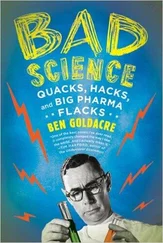Ben Goldacre - Bad Science
Здесь есть возможность читать онлайн «Ben Goldacre - Bad Science» — ознакомительный отрывок электронной книги совершенно бесплатно, а после прочтения отрывка купить полную версию. В некоторых случаях можно слушать аудио, скачать через торрент в формате fb2 и присутствует краткое содержание. Жанр: Публицистика, на английском языке. Описание произведения, (предисловие) а так же отзывы посетителей доступны на портале библиотеки ЛибКат.
- Название:Bad Science
- Автор:
- Жанр:
- Год:неизвестен
- ISBN:нет данных
- Рейтинг книги:5 / 5. Голосов: 1
-
Избранное:Добавить в избранное
- Отзывы:
-
Ваша оценка:
- 100
- 1
- 2
- 3
- 4
- 5
Bad Science: краткое содержание, описание и аннотация
Предлагаем к чтению аннотацию, описание, краткое содержание или предисловие (зависит от того, что написал сам автор книги «Bad Science»). Если вы не нашли необходимую информацию о книге — напишите в комментариях, мы постараемся отыскать её.
Bad Science — читать онлайн ознакомительный отрывок
Ниже представлен текст книги, разбитый по страницам. Система сохранения места последней прочитанной страницы, позволяет с удобством читать онлайн бесплатно книгу «Bad Science», без необходимости каждый раз заново искать на чём Вы остановились. Поставьте закладку, и сможете в любой момент перейти на страницу, на которой закончили чтение.
Интервал:
Закладка:
In 2001 the scare began to gain momentum. Wakefield published a review paper in an obscure journal, questioning the safety of the immunisation programme, although with no new evidence. In March he published new laboratory work with Japanese researchers (‘the Kawashima paper’), using PCR data to show measles virus in the white blood cells of children with bowel problems and autism. This was essentially the opposite of the findings from Nick Chadwick in Wakefield’s own labs. Chadwick’s work remained unmentioned (and there has since been a paper published showing how the Kawashima paper produced a false positive, although the media completely ignored this development, and Wakefield seems to have withdrawn his support for the study).
Things began to deteriorate. The antivaccination campaigners began to roll their formidable and coordinated publicity machine into action against a rather chaotic shambles of independent doctors from various different uncoordinated agencies. Emotive anecdotes from distressed parents were pitted against old duffers in corduroy, with no media training, talking about scientific data. If you ever wanted to see evidence against the existence of a sinister medical conspiracy, you need look no further than the shower of avoidant doctors and academics, and their piecemeal engagement with the media during this time. The Royal College of General Practitioners not only failed to speak clearly on the evidence, it also managed – heroically – to dig up some anti-MMR GPs to offer to journalists when they rang in asking for quotes.
The story began to gain momentum, perhaps bound up in the wider desire of some newspapers and personalities simply to attack the government and the health service. A stance on MMR became part of many newspapers’ editorial policies, and that stance was often bound up with rumours about senior managerial figures with family members who had been affected by autism. It was the perfect story, with a single charismatic maverick fighting against the system, a Galileo-like figure; there were elements of risk, of awful personal tragedy, and of course, the question of blame. Whose fault was autism? Because nestling in the background was this extraordinary new diagnosis, a disease that struck down young boys and seemed to have come out of the blue, without explanation.
Autism
We still don’t know what causes autism. A history of psychiatric problems in the family, early birth, problems at birth, and breech presentation are all risk factors, but pretty modest ones, which means they’re interesting from a research perspective, but none of them explains the condition in a particular person. This is often the case with risk factors. Boys are affected more than girls, and the incidence of autism continues to rise, in part because of improved diagnosis – people who were previously given labels like ‘mentally subnormal’ or ‘schizophrenia’ were now receiving a diagnosis of ‘autism’ – but also possibly because of other factors which are still not understood. Into this vacuum of uncertainty, the MMR story appeared.
There was also something strangely attractive about autism as an idea to journalists and other commentators. Among other things, it’s a disorder of language, which might touch a particular chord with writers; but it’s also philosophically enjoyable to think about, because the flaws in social reasoning which are exhibited by people with autism give us an excuse to talk and think about our social norms and conventions. Books about autism and the autistic outlook on the world have become bestsellers. Here are some wise words for us all from Luke Jackson, a thirteen-year-old with Asperger’s syndrome, who has written a book of advice for teenagers with the condition ( Freaks, Geeks and Asperger Syndrome ). This is from the section on dating:
If the person asks something like ‘Does my bum look fat?’ or even ‘I am not sure I like this dress’ then that is called ‘fishing for compliments’. These are very hard things to understand, but I am told that instead of being completely honest and saying that yes their bum does look fat, it is politer to answer with something like ‘Don’t be daft, you look great.’ You are not lying, simply evading an awkward question and complimenting them at the same time. Be economical with the truth!
Asperger’s syndrome, or autistic spectrum disorder, is being applied to an increasingly large number of people, and children or adults who might previously have been considered ‘quirky’ now frequently have their personality medicalised with suggestions that they have ‘traits of Asperger’s’. Its growth as a pseudo-diagnostic category has taken on similar proportions to ‘mild dyslexia’ – you will have your own views on whether this process is helpful – and its widespread use has allowed us all to feel that we can participate in the wonder and mystery of autism, each with a personal connection to the MMR scare.
Except of course, in most cases, genuine autism is a pervasive developmental disorder, and most people with autism don’t write quirky books about their odd take on the world which reveal so much to us about our conventions and social mores in a charmingly plain and unselfconscious narrative style. Similarly, most people with autism do not have the telegenic single skills which the media have so enjoyed talking up in their crass documentaries, like being really amazing at mental arithmetic, or playing the piano to concert standard while staring confusedly into the middle distance.
That these are the sort of things most people think of when the word ‘autism’ pops into their head is testament to the mythologisation and paradoxical ‘popularity’ of the diagnosis. Mike Fitzpatrick, a GP with a son who has autism, says that there are two questions on the subject which will make him want to slap you. One is: ‘Do you think it was caused by MMR?’ The other is: ‘Does he have any special skills?’
Leo Blair
But the biggest public health disaster of all was a sweet little baby called Leo. In December 2001 the Blairs were asked if their infant son had been given the MMR vaccine, and refused to answer. Most other politicians have been happy to clarify whether their children have had the vaccine, but you can imagine how people might believe the Blairs were the kind of family not to have their children immunised, especially with everyone talking about ‘herd immunity’, and the worry that they might be immunising their child, and placing it at risk, in order that the rest of the population should be safer.
Concerns were particularly raised by the ubiquity of Cherie Blair’s closest friend and aide. Carole Caplin was a New Age guru, a ‘life coach’ and a ‘people person’, although her boyfriend, Peter Foster, was a convicted fraudster. Foster helped arrange the Blairs’ property deals, and he also says that they took Leo to a New Age healer, Jack Temple, who offered crystal dowsing, homoeopathy, herbalism and neolithic-circle healing in his back garden.
I’m not sure how much credence to give to Foster’s claims myself, but the impact on the MMR scare is that they were widely reported at the time. We were told that the Prime Minister of the United Kingdom agreed to Temple waving a crystal pendulum over his son to protect him (and therefore his classmates, of course) from measles, mumps and rubella; and that Tony let Cherie give Temple some of his own hair and nail clippings, which Temple preserved in jars of alcohol. He said he only needed to swing his pendulum over the jar to know if their owner was healthy or ill.
Some things are certainly true. Using this crystal dowsing pendulum, Temple did claim that he could harness energy from heavenly bodies. He sold remedies with names like ‘Volcanic Memory’, ‘Rancid Butter’, ‘Monkey Sticks’, ‘Banana Stem’ and, my own personal favourite, ‘Sphincter’. He was also a very well-connected man. Jerry Hall endorsed him. The Duchess of York wrote the introduction to his book The Healer: The Extraordinary Healing Methods of Jack Temple (it’s a hoot). He told the Daily Mail that babies who are breastfed from the moment of birth acquire natural immunity against all diseases, and he even sold a homoeopathic alternative to the MMR jab.
Читать дальшеИнтервал:
Закладка:
Похожие книги на «Bad Science»
Представляем Вашему вниманию похожие книги на «Bad Science» списком для выбора. Мы отобрали схожую по названию и смыслу литературу в надежде предоставить читателям больше вариантов отыскать новые, интересные, ещё непрочитанные произведения.
Обсуждение, отзывы о книге «Bad Science» и просто собственные мнения читателей. Оставьте ваши комментарии, напишите, что Вы думаете о произведении, его смысле или главных героях. Укажите что конкретно понравилось, а что нет, и почему Вы так считаете.





![Роман Зыков - Роман с Data Science. Как монетизировать большие данные [litres]](/books/438007/roman-zykov-roman-s-data-science-kak-monetizirova-thumb.webp)






